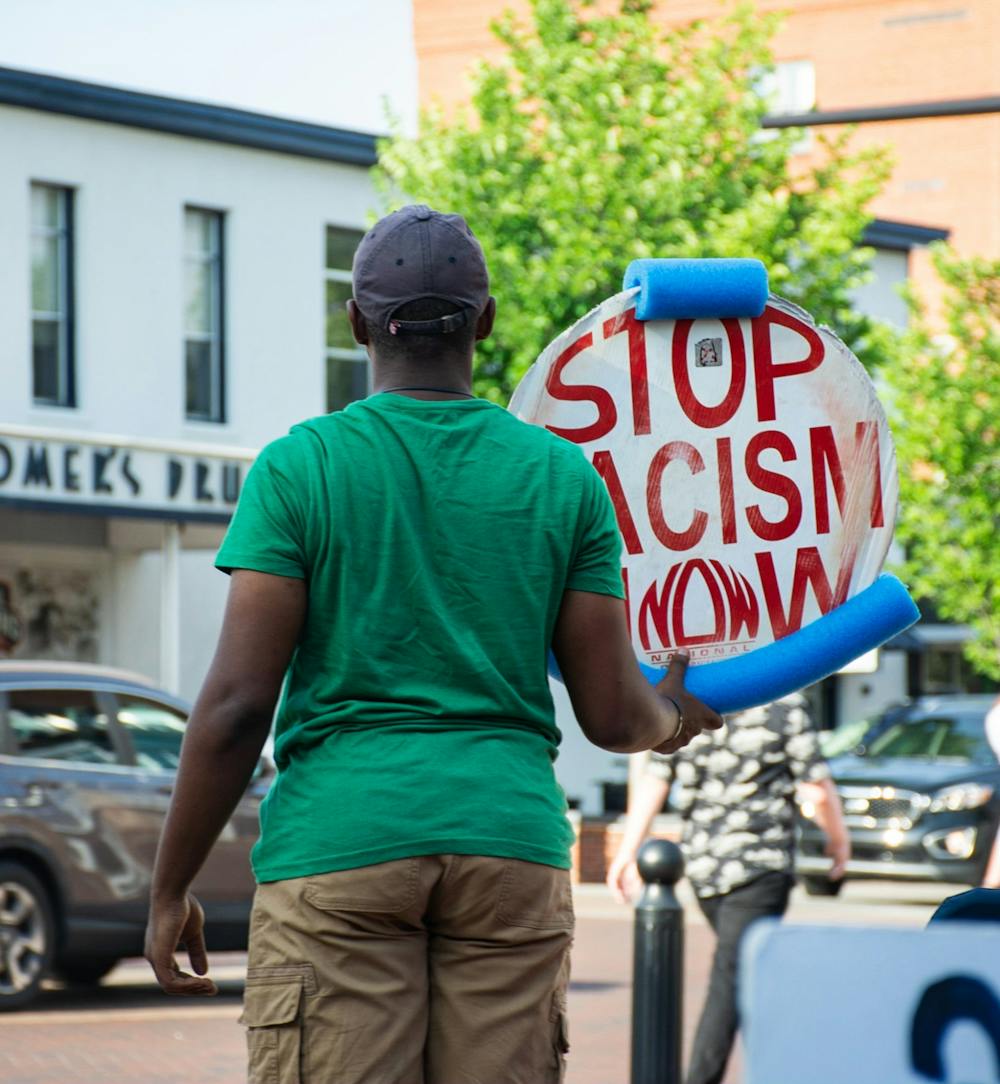On June 1, 2020, Kelli Thompson sat, for the first time, on Toomer’s Corner.
She didn’t actually make it to the side where she and a group of regulars now set up everyday.
It was the day after one of the protests that took place in Auburn at the end of last May in response to the killing of George Floyd. In the wake of the community coming together for a few hours enraged, emotional, passionate and engaged in the unity of it all, Thompson, like many others, was left with a feeling of, “What now?"
“My stomach was sick because Trump had just done that thing — you know, the photo op with the Bible in front of the church. I couldn’t be in the house anymore, and it was the day after the protest where we’d had hundreds of people show up,” Thompson said. “And I go to a lot of protests, so I dug around in a spare room until I found this, and I was like yeah this is good, then I came here.”
The first day after the protests downtown, her frustration only propelled her to make it to Toomer’s Drugs before she lost her nerve.
“I felt myself chickening out, because I was like, 'This sign is very big.' I felt very on display,” Thompson said. “I thought everybody’s surely looking at me, so I just sat down where I was and tried to personally deal with some heavy emotions.”
Two people joined her that day. The first was a man who was a part of the local synagogue, and he came with a kid and a poster. He’d seen her sitting there and had his own sign, so he’d thought he’d join her, and they talked for a half hour before another person came: A young woman, furious, bringing an intense energy against their calm.
“After about an hour of us sitting there, two cops come over on the other side and just stand there looking at us, arms crossed,” Thompson said. “It’s really upsetting this girl, she’s yelling across the street at them, and I’m trying to have this conversation like, they’re doing their job and they’re keeping their distance.”
After about two hours they left, and Thompson said she felt very refreshed after just two conversations with passersby.
The next day, she came back to see if the same thing happened, this time brave enough to make it to the other side, and someone joined her to talk. It was clear to her then that she wasn’t the only person feeling restless.
“Pretty early on I knew that this was going to be something, but I couldn’t really tell what, or where it would go,” Thompson said. “I was just going to keep coming back until I figured it out.”
Signs are one of few constants at what regulars call the “Great Toomer’s Sit-In." In sunshine or in a tropical storm, there will be someone on Toomer’s Corner everyday from 5-7 p.m., holding a sign and waving calmly at the cars and people that pass by.
All of them will have a sign. Some choose to bring their own signs, some choose to bear a replica of the sign Thompson has had since June 1. The sign says "STOP RACISM NOW" in big red letters. NOW is the acronym for the National Women’s Organization.
“I got it at D.C. at the Women’s March in 2019,” Thompson said. “They were giving a bunch of them away and I just grabbed one, and it’s a classic reprint. You can see this poster in like history books and stuff in images of protests from the '60s and '70s.”
As you ride by or as you browse their Instagram, you can see other replications of that poster, which are the result of the generosity of one community member.
“The guy who owns Stamp over there, Eric, he’s a friend of mine, and he saw me standing under a tree waiting for the rain to subside one day,” Thompson said. “Asked me what I was doing in the corner, I was like don’t want the sign to get too damaged, I want to keep doing this, and so he took a picture of the sign, and comes back a week later with a dozen of these vinyl reprints — the original is just cardboard — and he’s like now you can stand in the rain or give these out to whoever you want.”
This act of kindness wasn’t an isolated event and is just one of the many Thompson and the group at Toomer’s has experienced over the past year.
Another constant of the sit-in is daily count of interactions they get, negative or positive, which they document on their Instagram.
Thompson is an assistant research professor in the department of psychology at Auburn. She has a tendency to watch human behavior, and she realized each time she returned to the corner there were positive and negative reactions. After a year of observation, she said a pattern has emerged — positives are increasing, while the negatives stay constant.
Negatives come in several ways: head shakes, thumbs downs from car windows, frowns — and in more obvious ways too: shouts of "I love racism" and "Get a job" from various cars as they zoom by, spitting and quick flashes of a middle finger.
The more obvious negatives don’t happen quite as often as the subtler ones, and in comparison to the positive interactions, they occur less frequently.
Everyday, the positive interactions eclipse any negative interactions that might be counted. Positive interactions include waves, head nods, fists of solidarity, verbal support or even gifts.
Damarius Nolan-Watts, a unit supply specialist for the Army, has been a regular since about day 40. Watts brings structure to the group of four regulars.
He begins each sit-in by writing the day on the ground — June 1 was day 366 — and their Instagram handle, and immediately starts the tally of interactions, including some from earlier in the day. Thompson is there before him or not too far behind, dragging along a wagon, a gift from a manager at Mellow Mushroom, that holds their signs, pictures and a Bluetooth speaker.
On Tuesday, there were many signs and pictures on the corner, but there are a few that make an appearance. One, a poster of George Floyd that was painted for one of the protests, was given to Thompson by a graduating student to stay with them at the corner. Another, a painting of Breonna Taylor, was made by Bay Kelley, an artist and one of four regulars on the corner.
Leigh Anne Armstrong and Kelley join Thompson and Watts at the corner at 5 or sometime after. They greet each other and give updates on anything new that’s happened in the last day or so since they last saw each other.
Other people may join, but the four of them are usually always there in some combination.
A lot of idle time passes by on the corner. Depending on the day, a large part of the time may be spent simply greeting people who pass by. Thompson, Armstrong, Kelley and Nolan-Watts make conversation about whatever is on their mind that day. As the days drew closer and closer to day 365, they reflected on all the people that crossed their path, recounting a year's worth of stories, of hard conversations about race and life, accompanied by honking cars or the scratch of skateboards as people ride by.
It doesn’t feel like it's been a year since George Floyd died, Nolan-Watts said, holding his Stop Racism Now sign in one hand and waving at a car until it's out of his vision with the other. (No positive or negative interaction with that car; it’s a neutral.) The others seem to share the same sentiment — a year's worth of time feels like it only begun yesterday.
Kelley and Armstrong talk about projects they both started individually on the same March day last year. Kelley started doing a journal entry and a drawing a day with his daughter, and Armstrong has written a song every day for a year, all of which can be seen on her Instagram.
“I think you have close to 500 [songs] at this point, right?” Kelley said. “That’s a lot of time. Which is where the trickery comes in, right? Like how long do you let it go before it becomes something that's rote and meaningless?”
Armstrong didn’t hesitate to respond, waving at a car that honked as it passed by.
“Is there a way to make something that happens every single day of your life, and continue to make it have meaning?” Armstrong said.
There are a lot of lessons that can be learned through doing something for a year consistently, Kelley said, and he believes in that power.
“You’re seeing the tail end, but at the front end, it was far messier, and it was far meaner,” Kelley said. “But through this sort of consistent peaceful presence, it's powerful, it's really powerful, because we have been through it all and we are still here.”
On June 1, 2021, a crowd showed up for the celebration of the first year on Toomer’s Corner, old visitors who hadn’t been there in a while, and some who were coming for the first time, like Ward 6 City Council member Bob Parsons. There were popsicles, cupcakes and a banner for people to sign. Alongside names of people who’d shown up were the names of those whose lives had been lost to police brutality.
When the festivities were dying down, Thompson sat silently beside her wagon and her speaker, holding the original cardboard sign she’d brought with her on that first day. They’d just finished doing the Cupid Shuffle, they do everyday at 6 p.m., a tradition that started when Kelley’s wife wanted to see him on the City's Toomer’s Corner livestream. It was a bit noisier than usual.
“I think as long as there's a conversation that we need to be having as a country, I want our little town to be active and engaged in that conversation,” Thompson said. “Could easily go another 365 days and more.”
Kelley and Armstrong recalled a conversation they were a part of near the beginning of their time there.
“I don’t remember the specifics of it, but I remember the person, and he was very hesitant to sort of, engage in the conversation,” Kelley said. “And that was my sort of awakening. He was willing to be vulnerable and put himself out there and ask questions and hear our answers and to sort of question his own judgment. He did it beautifully, and I was like, 'This is what we all need to be doing. Why aren’t we doing this?'”
Armstrong agreed.
Her motto is ‘Lead and listen with love,’ and it's the way she approaches every person that crosses her path on the corner or otherwise. It’s produced many conversations like the one she and Kelley were a part of, and it keeps bringing people back.
“Treating people like they are people,” Kelley said. “If we can pull them into a conversation, we’re more likely to have sort of a connection, and real connections are where change start to happen.”
Nolan-Watts said the thing that motivates him to come back every day is fear that those conversations won't happen anymore.
“It’s one of my worst fears,” Nolan-Watts said. “I feel like if we don’t keep coming back, the conversations will just stop.”
When the clock tower rings at 7, Nolan-Watts takes pictures — of the group that showed up, their interactions, the day. When people pass through and stop for a conversation, he gives them chalk before they leave, and they write their name down in the heart. Everyone who passes through has the opportunity to become a part of their community if they choose, and they will be documented on their Instagram.
Thompson packs everything up, while Kelley, Armstrong and Nolan-Watts help and linger. They chat for a bit, and then they go their separate ways. They will be back the next day, in some combination, with their signs and speaker, ready for another day of conversations.
Do you like this story? The Plainsman doesn't accept money from tuition or student fees, and we don't charge a subscription fee. But you can donate to support The Plainsman.

Destini Ambus, senior in journalism, pursuing a minor in sociology is the editor-in-chief of The Auburn Plainsman.





